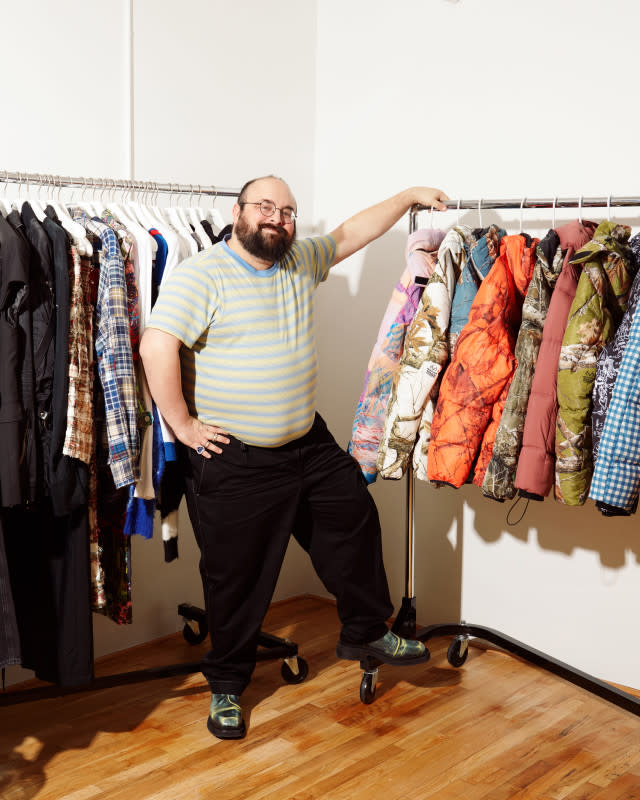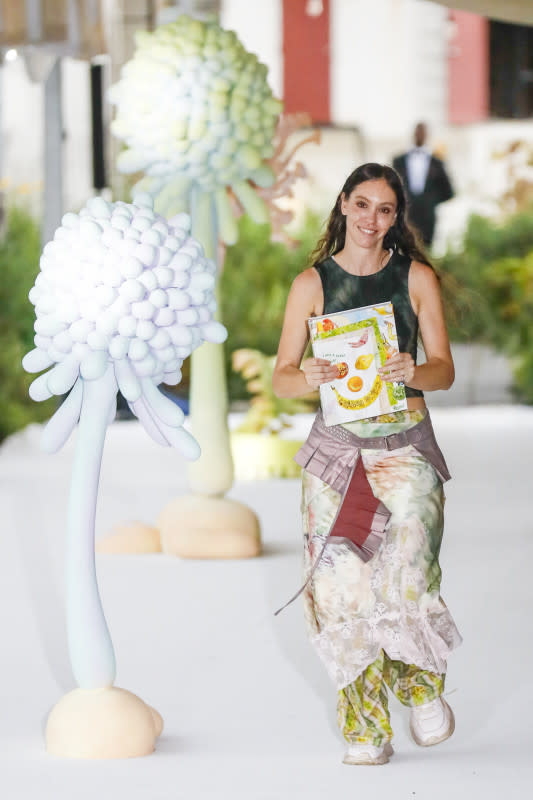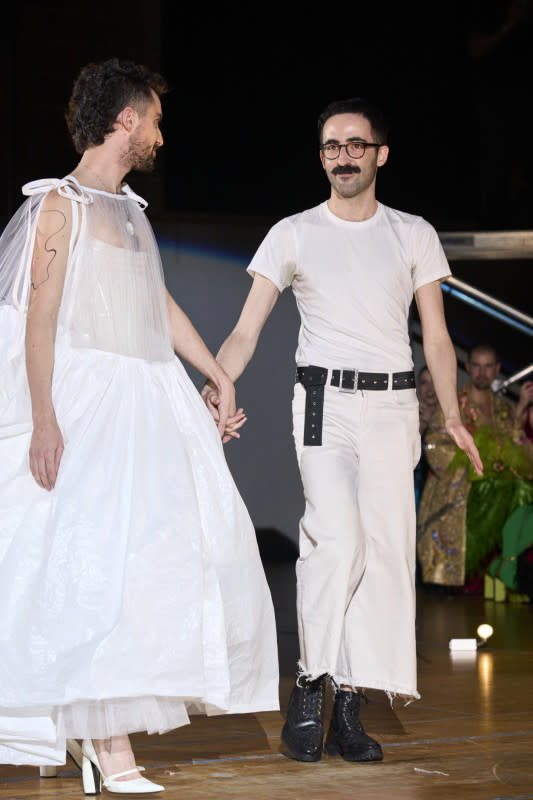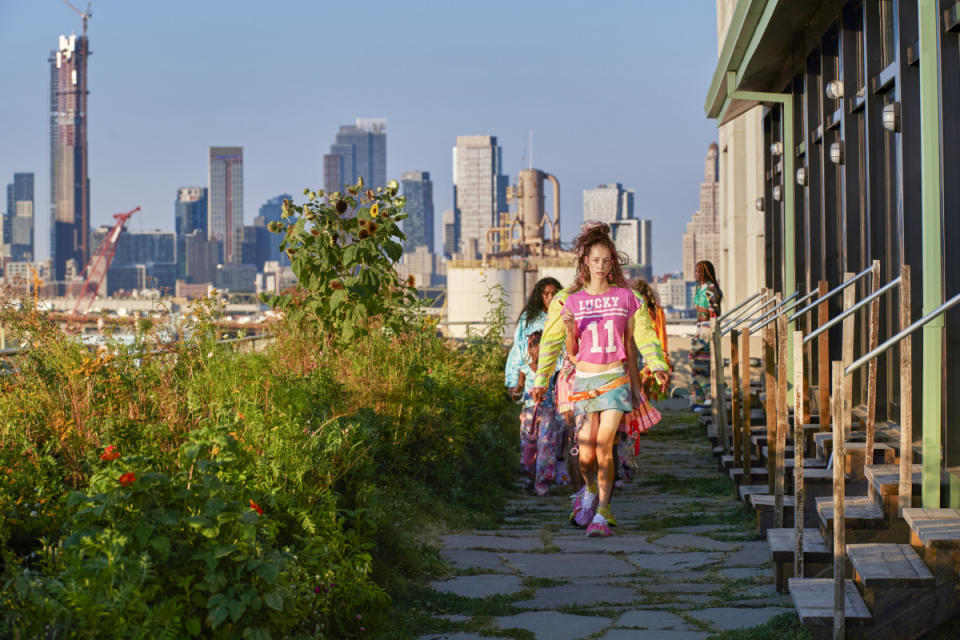How Lindsey Solomon Became the PR Go-to for Emerging Fashion Brands

Photo: Cody Guilfoyle
In our long-running series "How I'm Making It," we talk to people making a living in the fashion and beauty industries about how they broke in and found success.
When Lindsey Solomon was in his last year at NYU, he spent five busy, rewarding months interning for Stella McCartney. While his stable of duties included the standard intern fare (preparing samples, mastering bookkeeping), it also involved something much more glamorous: working on the brand's Fall 2013 ready-to-wear debut.
"I have very fond memories of working on that presentation — inviting press, working with them on invites, things of that sort," he remembers. "The day of [the event], they sent me to the FedEx on 23rd and 7th to print a copy of the lookbook, and I missed the entire thing. I cried so hard."
A soul-crushing experience, yes, but also something of a testament to what it takes to make it in the fashion business: You have to really, really, really love it — and, ultimately, fight for it — to find your place in its orbit.
A decade in, Solomon has done just that. After seven years cutting his teeth at a selection of top-tier PR operations, the Long Island native stepped out on his own to launch Lindsey Media, a fashion and lifestyle communications firm with a special stake in emerging brands, in 2020. New York City "It" labels like Collina Strada, Interior, Wiederhoeft and more rely on his meticulously honed expertise to build, elevate and ultimately scale their craft.
"I seem to have a good understanding of what people are interested in. I think it's an accomplishment for me to consistently present new brands and designers, and do it in a way that gets them coverage," he says. "Because at the end of the day, we're in the business of championing young designers. If I'm not doing that, I'm not doing my job."
I spoke with Solomon about building out his portfolio, what he prioritizes with clients and the lessons he still carries with him from early on in his career.
Tell me about the origins of your interest in fashion, before you pursued it as a career.
Growing up, I was very much a typical gay boy who went through his mom's stuff. There's definitely photos of me wearing my mom's heels. I have a very distinct memory of telling my grandmother that I wanted this Barbie's hair cut in a very specific way — with a blunt bang à la [Spice Girl] Emma Bunton. But I was very interested in how I presented myself. I still don't own that many sweatpants.
I remember going through fashion magazines and making sure I educated myself in terms of what fashion was. In high school, I watched a lot of cheesy fashion shows, like "America's Next Top Model" and "Project Runway."
You're going to laugh hysterically at what my career impetus was, when I was like, "This is what I want to do" — it was Kelly Cutrone's Bravo show, "Kell on Earth," in, like, 2010. There was just something about it where I was like, "I want to be that girl." I ended up being the PR director of my high school theater club, doing all the press releases, a lot of the flyers... So I definitely knew I wanted to be in PR.
When I was 15, 16 years old, I emailed different brands I wanted to intern for, like Jil Sander, saying, "I really want to intern for you." A very sweet PR assistant responded and was like, "Try a little later, girl."

Photo: Victor VIRGILE/Gamma-Rapho via Getty Images
Walk me through your career path from the time you graduated from NYU to when you launched Lindsey Media in 2020. What lessons did you learn in those early days that you still carry with you today?
I've always found that so many brands just need someone to be a guiding light to walk them through how things work, and not in a condescending, I'm-going-to-mansplain-to-you kind of way. I've learned how to make sure I'm being accountable for myself, but also keeping the client accountable — saying, "This is what needs to get done in order for someone to write about you," and making sure the client is aware of how their actions impact their own PR strategy. The strongest client relationships are the ones where you're in constant communication and you're supporting each other.
Take someone like [Hillary Taymour, creative director of Collina Strada], who I've worked with for seven or eight years now. I talk to her every day, more than my mom. Our relationship works because she'll come to me with ideas I haven't even thought of. I feel total support because we're working toward a common goal.
I very much believe that PR is a storytelling device. There should be a clear narrative from start to finish about what sets you apart. Just because you have a brand, you have strong imagery and your stuff is cool doesn't mean someone's going to write about you.
Your firm has been recognized for its representation of independent designers. How do you go about building out your portfolio?
I'm very lucky in the sense that, before I went solo, I accomplished everything I wanted to. But during the pandemic, I felt like something was calling me to do something different. When I started the company, I locked myself in my apartment for like, three weeks and I made a list of brands on Instagram I liked. I did my research in terms of what people were talking about on Ssense; if a designer was starting to pop off, I took note of what they were doing.
I started off with Wiederhoeft, which, obviously, was probably the best decision I ever made in my life. I could not have landed a better first client, ever. My second client was Presley Oldham, who has a pearl-necklace brand and is doing amazing work.
I was working out of my apartment from July 2020. It wasn't until I signed Kara and Reike Nen in early 2021 that I was like, "I need to get an office." So, I got an office, and things went from there.
I get referrals all the time. I take tons of new business calls with brands I like, and they sometimes say, "I can't afford you. But we're so glad to be in conversation." And then a year or two later, I'm the first person on their list when it's time for them to do PR. Sometimes I'm baffled that one email I wrote them two years ago still resonated with them years later.

Photo: Launchmetrics Spotlight
What are your priorities for your clients once they sign on with you?
First, I run them through admin stuff — lookbooks, flats, brand bios, things of that sort. Ultimately, I've found that so many of my clients dictate where their strategy goes. And what's exciting about that is that, at the end of the day, I'm offering them four pillars of services: brand stories/brand profiles, shopping placements, editorial-slash-VIP sample management and, finally, influencer relations. And nine times out of 10, the client will come to me and know what their wishlist is, so it's almost set for me from the get-go. This allows me to come back to them and say, "If you're excited about A, then B and C should be next in line."
I have some clients that are much more focused on celebrity and VIP. With something like Wiederhoeft, it's much more about making sure we're using the samples appropriately, because they're so delicate and expensive. I have others, like Collina Strada, where it's more about strategizing how I'm using [Taymour's] time in terms of interviews.
What role have mentors played throughout your career in fashion?
I've been very lucky to have strong mentors in my career.
I'm not just saying this, but I'd say the biggest mentor of all has probably been [Taymour]. I've seen her brand grow exponentially. She's very conscious of what I'm doing, and that trust has allowed me to do a lot of things that have contributed to her success. She's been one of the people I can talk to very intimately about my business and where I'm going and what I'm doing.
I would also say that I'm very lucky that I had a lot of editor friends who have not necessarily been mentors, but have been champions in the sense that they're constantly throwing opportunities at me or have allowed me to grow into the role I have now — in terms of having a firm that people respect. Brooke Bobb, who's now at Harper's Bazaar, has helped a lot. Gabrielle Korn has been a great mentor, since she was at Refinery29; she was one of the first people to be like, "I think you could do this on your own."

Photo: Launchmetrics Spotlight
If you were to go through the highlight reel of your career, what would be the big moments that stand out to you, and why?
Collina Strada did a show at the Brooklyn Grange in Sunset Park in September 2021. It was the first New York Fashion Week after COVID [lockdowns], and it was a big show with like, 700 people. At that point, Lindsey Media was just myself and three or four freelancers and interns. To be able to pull it off was a big thing.
Being able to guide someone like [Jackson Wiederhoeft] to win the Vogue/CFDA Fashion Fund, and to work with him quite collaboratively, was a big moment for me. I was really proud of him, obviously, because it allowed him to take a step forward.
But the thing I'm most proud of is that l don't have a big staff. It's most often me, three employees and a couple of interns, and we pull off some of the bigger shows of fashion week in a way that, I think, sends a message to other, bigger firms that they don't need to be so overloaded with staff.
What advice would you give to somebody just starting out and looking to follow a similar career path?
Really look at what PR firms are doing and make sure it falls in line with your goals or what you're interested in. What's been nice is that in the last four or five years, so many PR firms, mine included, have begun to diversify our services.
You look at somewhere like DLX, and they're good at doing hospitality in a very fashion-y way. You look at Karla Otto, and they've been good at taking on corporate brands, like UGG and Timberland, in a way that doesn't feel like it's too creatively stifled. You look at someone like Gia Kuan, who's doing a lot of interesting arts press. So, look at what the company is doing, what their clients are doing and if it feels like you can sink your teeth into it. Because it's not just fashion anymore: It's art, it's movies, it's home goods, it's design. You have to be a jack of all trades, in a lot of ways. You have to figure out how to make it happen.
This interview has been edited and condensed for clarity.
Never miss the latest fashion industry news. Sign up for the Fashionista daily newsletter.

